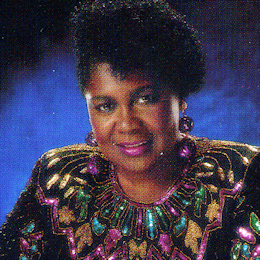We lost another King last week. While we were still grieving the loss of Ben E. King, the news came that B.B. King had passed away. B.B. was one of those people who seemed as if they were always a part of our lives, and now there’s a hole in our hearts in that place where B.B. King once lived. I have more thoughts on B.B., but I want to take another week to get them together.
This week I want to focus on Dorothy Moore who was born in Jackson, Mississippi in 1946. Her father, Melvin Hendrex, was better known by his stage name that he employed as a member of the Five Blind Boys of Alabama, Melvin Henderson. Like so many of the great soul artists, Moore began singing as a member of the gospel choir at her church.Eventually Moore went on to attend Jackson State University where she was a part of a group called the Poppies with Petsye McCune and Rosemary Taylor. The Poppies signed to Date Records, an Epic imprint, and had a #56 hit on the Billboard Hot 100 with “Lullaby of Love” in 1966.
Moore went solo and released singles for the Avco, GFS, and Chimneyville labels. Real success, however, eluded her until she signed with Malaco Records and released a series of ballads for the Jackson-based label. The first of the Malaco singles was “Misty Blue,” which was released in 1975.
Bob Montgomery wrote “Misty Blue” in 1966. He said that the song took him 20 minutes to write, and he wrote it with Brenda Lee in mind. But Lee turned it down despite the fact that her producer Owen Bradley loved the song and tried to push her to do it. Eventually Bradley produced a country version of the song for Wilma Burgess. The Burgess single was released in October, 1966 and made it all the way to #4 on the C&W chart in 1967.
Eddy Arnold released his version of the song in May of that year, and it did even better, making it to #3 on the C&W chart. Arnold’s version had crossover success as well, reaching #57 on the Billboard Hot 100, and #3 on the Easy Listening chart. In 1976 Billie Jo Spears took the song up the Country chart again, reaching #5.
Moore recorded her version in one take at the Malaco studio in 1973. Joe Simon had released the first R&B version of the song the previous year and had a minor hit with it. Malaco owner Tom Couch shopped the Moore single around to several labels, but couldn’t find a buyer for it. By 1975 the company was nearly out of money and used the last money they did have to press and release the Moore’s record with “Here It Is” as the A-side, and “Misty Blue” on the flip. In Miami the great Henry Stone picked up the record for national distribution through his TK Productions, pushing the record’s B-side.
Moore’s record got airplay in Chicago and Washington, D.C., and finally broke in the southern states in April, 1976. Eventually the single made it to #2 on the R&B chart, and #3 on the pop chart. The record was also nominated for a Grammy in 1976, and found great success overseas as well. “Misty Blue” returned to public attention when it was part of the soundtrack for the John Travolta film “Phenomenon” in 1996.
Moore followed up her hit with a cover of Willie Nelson’s “Funny How Time Slips Away,” which made it to #7 on the R&B chart and #58 on the pop chart. Next came “I Believe You” which was #5 on the R&B chart and #27 on the pop chart in 1977. After taking some time off, Moore returned with a gospel album in 1986 before releasing two albums for Stax Records. In 1990 Moore returned to her hometown label, Malaco, where she continued to release albums in the ’90s and into the new century. She started her own label, Farish Street Records, in 2002.
Dorothy Moore has won four Grammy awards in all. She is a member of the Mississippi Musicians Hall of Fame. Her last album, Blues Heart, was released on Farish Street in 2012.
https://www.youtube.com/watch?v=QqokWGscbps&spfreload=10







Comments